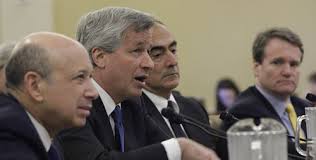This site has never printed an entire news article from another site, but this is a great story about how bond traders lied during the 2007-2008 housing fraud that led to the financial crash. That housing crash resulted from top-down and bottom-up fraud involving realtors, mortgage companies, hedge funds, banks, traders, and global investment firms. It involved people making minimum wage to $50 million in bonuses. It was a great example of unregulated capitalism, and it will happen again.
This story is another example of how the wheels of justice turn very slowly for white-collar criminals yet move at light speed for the average citizen. It’s a sad commentary on the justice system.
Here is the story from Bloomberg News.
Why a Jury Is Pondering When Bond Traders Can Lie: QuickTake Q&A
By Chris Dolmetsch and Matt Scully
“(Bloomberg) — A federal jury in Hartford, Connecticut, is weighing fraud charges against three former mortgage-bond traders over their conduct while working for Nomura Holdings Inc. The case has drawn broad attention because of the unusual questions the jury is being asked to consider: When is it right to deceive a customer, and when is it not? How big does a lie have to be to be a fraud? Is it OK to lie if you assume your customer assumes you’re lying because everybody lies?
1. What’s the Nomura case about?
Ross Shapiro, Michael Gramins, and Tyler Peters are accused of lying to customers about the prices of mortgage-backed securities and training subordinates to do the same to boost their compensation. They are charged with conspiracy and fraud.
2. How did they allegedly lie?
Prospectors pored over electronic records of hundreds of trade negotiations and presented the jury with 20 examples. In one, Nomura traders are shown telling a money manager via electronic chat in 2011 that they paid 86 1/32 for a bond when, in fact, they had paid 85 25/32. The false purchase price was used as a negotiating tactic to induce the money manager to pay a higher price for the bond.
3. Why is this case being prosecuted?
It’s part of a U.S. crackdown on illegal trading practices in the opaque world of securities backed by assets such as home mortgages. The effort started in January 2013 with the arrest of former Jefferies LLC bond trader Jesse Litvak, who is appealing his conviction and two-year prison sentence. U.S. prosecutors have brought a handful of criminal cases, and the Securities and Exchange Commission has extracted civil fines and trading bans.
4. Why is the mortgage bond market susceptible to lies?
These highly complex securities don’t change hands very often; when they do, transactions take place between specialized traders who haggle over prices. Those tussles determine the yields that investors ultimately earn on the bonds. However, few everyday investors are knowledgeable enough to understand the connection between the prices paid for bonds they own directly or indirectly and the resulting investment returns.
5. What makes a lie a crime?
According to the government, traders are guilty when they intentionally misrepresent a bond’s acquisition or sales price during negotiations. The lie must be “material,” meaning a “reasonable investor” would consider it “important” in making an investment decision. As Assistant U.S. Attorney Liam Brennan told jurors in his summation of the Nomura case, “To say that these are sharp business practices, and everyone engaged in them, is not just an affront to everyone in the securities industry, it’s an affront to everyone in every industry that has ever tried to be an honest dealer.”
6. What does the defense say?
Lawyers for the traders maintain that mortgage-bond deals occur between sophisticated professionals backed by extensive research and that claims about prices are taken with a grain of salt. They say a lie is material only if it “significantly altered the total mix of information available to the reasonable investor in making an investment decision.”
7. How widespread is lying in finance?
It’s hard to tell. In the wake of the financial crisis, financial firms have added thousands of compliance employees seeking to keep their companies on the straight and narrow. Algorithms and artificial intelligence help to comb through terabytes of voice and data files, but sometimes, it still takes human judgment to assess honesty. “When you’re dealing with people in the dark corner of the market, there’s going to be fraud,” said Peter J. Henning, a Wayne State University Law School professor in Detroit. “Nobody talks about stock prices. You look it up.”
8. Is anything changing because of these cases?
In the bond market, many traders have become reluctant to do business over office phone lines, email, and chats that leave a trail for bosses and authorities. Many are resorting to messaging apps that technically are a no-no on Wall Street. Still, others are reluctant to discuss the prices they’re paying for bonds for fear of getting caught in what might look like a lie. And market analysts say liquidity has been reduced, which makes it more difficult and expensive to trade.”











